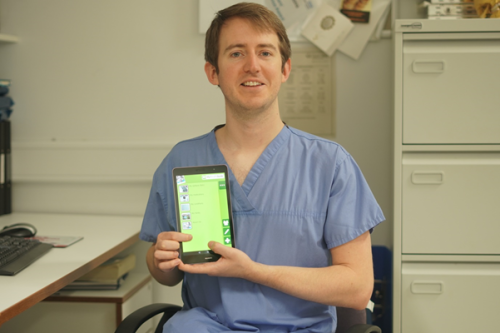Barts Health and UCLPartners implement Hear Me Now to help people with learning disabilities

More than
85%
found Hear Me Now helpful and easy to use
Maldaba partnered with Barts Health NHS Trust and UCLPartners to improve quality of care and communication for people with cognitive impairment, specifically adults with a learning disability who have additional diagnoses such as neurological and gastrointestinal diagnoses.
Barts Health NHS Trust is a leading healthcare provider and one of the largest NHS trusts in the country, including a turnover of £1.7billion and a workforce of around 17,000. The Trust’s five hospitals deliver high quality compassionate care to the 2.5 million people of East London and beyond.

Funded by UCLPartners, the project was led by Professor Amitava Banerjee, Honorary consultant cardiologist at Barts Health NHS Trusts and was run by Dr Richard Fitzgerald, Academic Clinical Fellow in Special Care Dentistry at Barts Health. The pilot of Hear Me Now was conducted at the Royal London Hospital and people with learning disabilities were involved in the project team to create the project literature. Maldaba trained Dr Fitzgerald and colleagues from the Trust and community team in the use of Hear Me Now and provided on-going support to the team during the project.
It was quite clear through the interviews with participants and their families that the Hear Me Now app was well-liked and effective. One of the most interesting findings for me were that family members reported a feeling of reassurance that all medical information was in one place if it was needed for emergencies. Alongside this it was interesting to see that the self-reported use of the app was high, suggesting that worries about digital literacy in this population may be unfounded.
Dr Richard Fitzgerald
Academic Clinical Fellow in Special Care Dentistry at Barts Health

Nearly
2/3
agreed it helped communication at healthcare appointments
Nearly 40 outpatients living with learning disabilities were supported with Hear Me Now at the Royal London Hospital between May 2019 and January 2021. People with learning disabilities, their family and carers and staff were all trained on the service. Many people self-reported improvement in quality of care.
After using Hear Me Now for 12 months participants were followed up and 30 provided feedback. Over 85% (26/30) found that Hear Me Now was helpful and easy to use and nearly two thirds agreed it helped communication at healthcare appointments. The primary use for Hear Me Now was to record healthcare information and other uses, including: collection of important information for emergencies, informing carers when no family were present at healthcare appointments, and keeping up-to-date on the status of current health.
Really useful. Has all information there so (I) don’t need to explain. Especially when (parents) are not there ….. when (patient) is with carers.
Parent of project participant
The project was awarded a research dissemination prize from the British Society of Disability and Oral Health to present project findings at an international conference and Dr Richard Fitzgerald, was awarded a DigitalHealth.London Digital Pioneers Fellowship through the project work.
Outcomes
- > 85% found Hear Me Now helpful and easy to use
- Nearly 2/3 said it improved communication at appointments
- 9/10 healthcare staff agreed that it would improve communication and the quality and consistency of care
- 100% of healthcare staff said Hear Me Now would be helpful at clinics
Contact us to learn how we can help you
Speak to us about how Hear Me Now can help your organisation to increase independence for people with cognitive impairments in your area.


